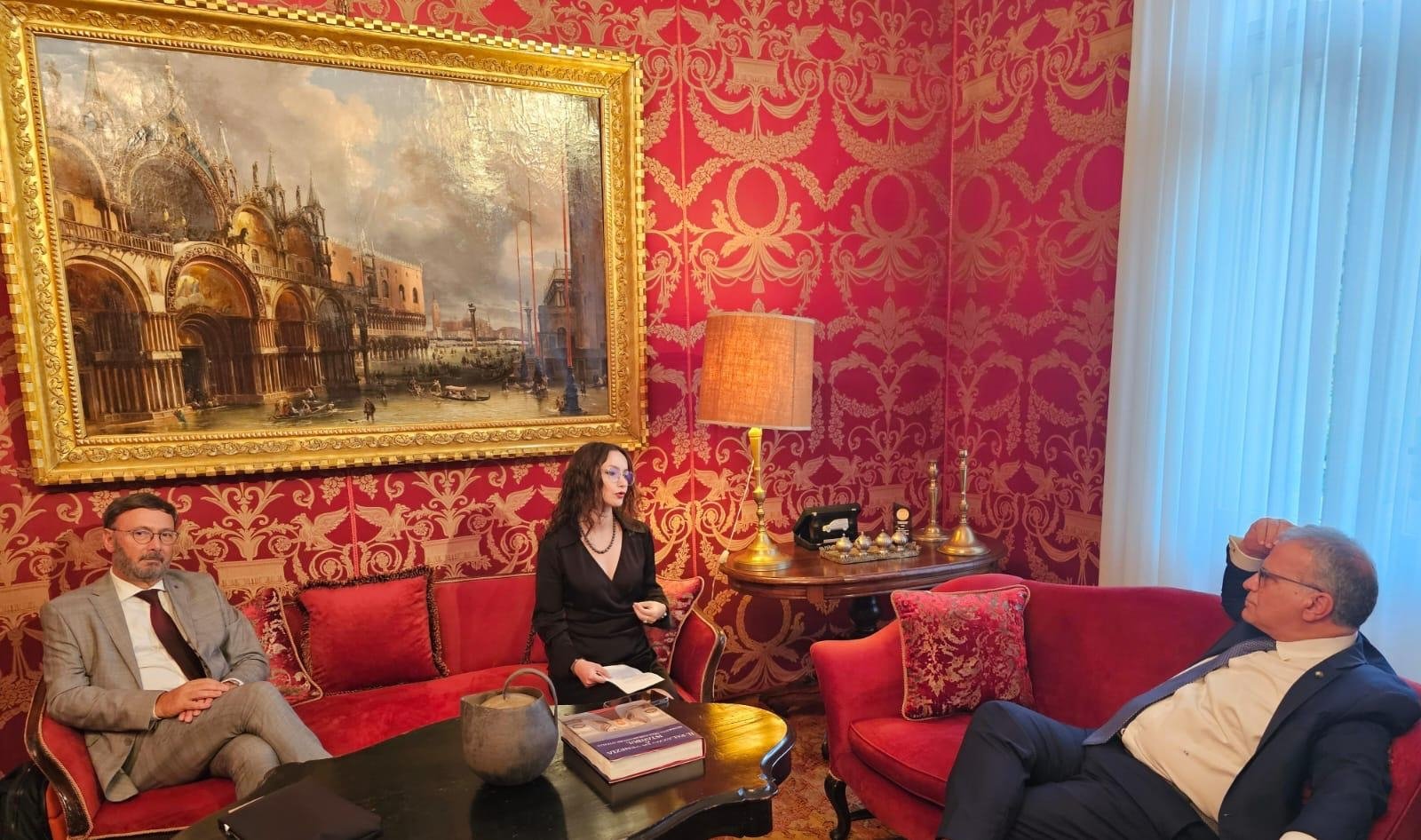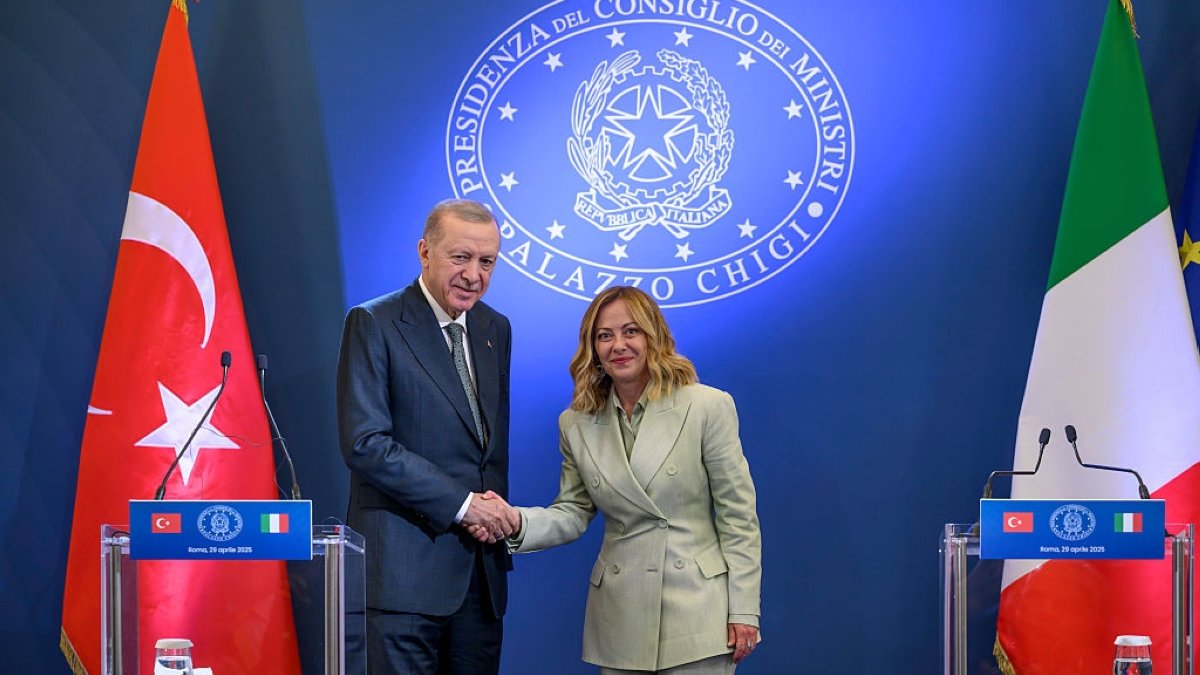Türkiye and Italy, two Mediterranean powers and NATO allies, are enjoying an unprecedented high, even a “golden age,” in their relations with enhanced economic and trade ties, deepening cooperation in the defense industry, and strengthening regional security.
The recent bilateral meeting between Foreign Minister Hakan Fidan and his Italian counterpart, Antonio Tajani, in Rome, resulted in the signing of a key agreement. However, the deal is merely another link in the growing chain of agreements shared between Türkiye and Italy in recent years.
Italy’s ambassador to Türkiye, Giorgio Marrapodi, described the meeting between Fidan and Tajani as “very meaningful.” Türkiye-Italy relations are “at their top moment,” Marrapodi told Daily Sabah in an exclusive interview.
Marrapodi said that having two recent intergovernmental summits, the first being in Ankara in July 2022, and the second in Rome in April 2025, marked a significant point in the diplomatic dialogue between the two countries. The consistent exchange of high-level visits and meetings between the heads of state and ministers, including Italian Prime Minister Giorgia Meloni’s latest visit to Istanbul on Aug. 1 at a trilateral summit, has also empowered Türkiye-Italy ties, he added. However, this is “only a part of the bigger picture, because the two leaders have met for bilateral talks and have involved themselves on the occasion of every multilateral event they participated in,” he said.
From large to small-scale co-op
During Fidan’s latest visit to Rome, the strong strategic alignment led to the setting of a new annual trade target of $40 billion, up from $32.2 billion in 2024. In the first five months of 2025, Türkiye’s exports to Italy reached $5.3 billion, with an increase of 7.5% compared to the same period in 2024. Italy is Türkiye’s fifth-biggest export market globally and the second largest within the European Union.
Marco Natali, president of Confprofessioni (Confederation of Italian Independent Professionals), described this period of Türkiye-Italy relations as a “historical moment” and “golden age.” He noted that beyond cooperation at the governmental level, there is also a “strong mutual interest among small and medium-sized enterprises” between Türkiye and Italy.
Natali, who visited Istanbul with a delegation from Confprofessioni for engagement with the Foreign Economic Relations Board (DEIK) and Independent Industrialists and Businessmen Association (MÜSIAD) and to explore opportunities for professional and sectoral cooperation, stated that Italian independent professionals regard Türkiye as a “natural partner that complements Italy’s own economic environment” mainly because “both are Mediterranean countries, facing the same region with the same opportunities.”
“The fact that we are here today sends a positive signal. It shows not only the importance of our political and economic relationship, which has already been strong, but also reflects a unity of intent and a warm, collaborative atmosphere,” he added.

Italy’s ambassador to Türkiye, Giorgio Marrapodi (R), Confprofessioni President Marco Natali (L) and Daily Sabah editor Ayşe Begüm Gürkan speak during an exclusive interview at the Venetian Palace, Beyoğlu, Istanbul, Türkiye, Sept. 12, 2025. (Courtesy of the Italian Consulate in Istanbul)
Türkiye-EU Customs Union
To further develop already positive political and economic relations with Italy and the other European Union countries, Türkiye has sought to join the EU and has been advocating for the modernization and expansion of the EU-Türkiye Customs Union.
“The current structure of the Türkiye-EU Customs Union does not fully align with today’s trade dynamics, and both sides agree on this point,” Trade Minister Ömer Bolat said in July. Bolat also stated that Türkiye and the EU “cannot manage the trade of 2025 with rules established 30 years ago.”
Türkiye, as the only non-EU country with a customs union agreement with the bloc, signed the agreement in 1995. Türkiye has been a candidate for EU membership for over two decades, but talks stalled in 2016 over what Ankara says is the bloc’s “insistence on politicizing the issue.” Türkiye has fulfilled 66 out of 74 criteria for EU accession so far and says working on the remaining six.
Underlining the fact that Italy has been “supporting Türkiye in its endeavors” regarding the EU, the ambassador said: “I think the situation today is better than it was a couple of years ago. Talks have started in Brussels, and the relations have improved a lot, with many high-level visits to Türkiye by EU commissioners. The high-level dialogues that had been suspended for some time, have been revamped in many fields. So, I think we are on a positive path.”
However, there are still “some obstacles that need to be overtaken,” he added.
Natali attributed the EU’s indecision on the matter to ongoing significant global and regional crises, including U.S. President Donald Trump’s tariff policies and the Russia-Ukraine war, which the bloc has struggled with. “These have had a significant impact in terms of unity of the union,” he said, adding that divisions also exist among EU member states regarding their perspectives on Türkiye.
NATO allies, industry partners
Despite the challenges, Marrapodi and Natali highlighted that Italy remains a committed partner of Türkiye, particularly in their shared membership of intergovernmental organizations.
Referring to Türkiye’s NATO membership and the defense cooperation, the ambassador said that there has already been “a strong cooperation between the two strong NATO allies” in the past, and one of Türkiye’s major defense companies, Baykar’s acquisition of Piaggio Aerospace, and cooperation with Leonardo, contributed to the partnership in the defense sector.
At the end of May 2025, Turkish drone manufacturer Baykar finalized the acquisition of the Italian aviation company Piaggio Aerospace and reached a partnership agreement with the Italian defense firm Leonardo. The collaboration focuses on developing unmanned fighter jets, armed surveillance drones and deep-attack drones.
With the second-largest army in NATO, Türkiye has prioritized substantial investment in its defense and national security sectors, establishing a prominent role as a regional security leader.
Türkiye and Italy also share a mutual interest in strengthening security in the Mediterranean in terms of cross-border organized crime and promoting stability in Libya, which is a major hub of human trafficking.
Out of more than 31,000 people who arrived in Italy in the first six months of 2025, approximately 27,000 departed from Libya and almost all from the eastern part of the country.
During Meloni’s visit to Istanbul last month, she, President Recep Tayyip Erdoğan and Libyan Prime Minister Abdul Hamid Mohammed Dbeibah held a trilateral summit focused on the prevention of illegal migration and establishing stability and security in Libya and the broader Mediterranean.
The latest agreement between Fidan and Tajani also aims to slow the movement of unauthorized migrants toward Europe via Italy and is expected to have a significant impact in Libya.

